Knowing what to eat before a Triathlon is crucial for ensuring success in your event. The days leading up to the race play a significant role in determining your performance.
As a triathlete, it’s essential to focus on your nutrition during this time to ensure your body is fueled and ready for the challenge ahead.
Knowing what to eat before a triathlon can make all the difference in your ability to endure the race and achieve your best results.
In this informative guide, we will delve into the fundamental topics of pre-race nutrition, covering the best foods to eat the day before the race and on the race day itself.
We will also provide you with essential tips on what foods to avoid and how to maintain your energy levels throughout the event. Additionally, we will suggest a selection of pre-triathlon meals that you might consider.
Reasons why what you eat before a Triathlon is crucial
The nutrition choices a triathlete makes before a triathlon are of utmost importance for optimal performance and overall race-day experience.
Proper pre-race nutrition directly impacts energy levels, endurance, and mental focus, ensuring that athletes can perform at their best during this demanding endurance event.
Let’s delve into why pre-triathlon nutrition matters and how it can positively influence your race day:
Fueling Energy Reserves: A well-balanced meal before a triathlon ensures that your body has enough energy reserves to draw from during the race.
Foods rich in carbohydrates serve as the primary fuel source, providing the essential glycogen needed to sustain prolonged physical activity.
Reducing Fatigue: Adequate pre-race nutrition can prevent premature fatigue, allowing you to perform optimally in each stage of the triathlon.
Protein intake supports muscle repair and recovery, reducing the risk of early muscle fatigue.
Boosting Mental Focus: A nourishing pre-triathlon meal can enhance mental clarity and focus, helping you make quick and strategic decisions during the race.
Proper nutrition supports brain function, allowing you to stay sharp and motivated.
Preventing Gastrointestinal Distress: Opting for easily digestible foods before the race reduces the risk of gastrointestinal discomfort during the event.
Foods low in fiber and fat are easier on the stomach and less likely to cause issues.
Hydration Preparation: Proper hydration before the triathlon is crucial. Hydrating well in advance ensures that you start the race in a properly hydrated state, improving overall performance and reducing the risk of dehydration.
Preventing Bonking: Bonking, or hitting the wall, is a condition where your energy stores are severely depleted, leading to sudden fatigue.
By consuming sufficient carbohydrates before the race, you can reduce the risk of bonking during the event.
What to eat the day before a Triathlon
The day before your triathlon is a critical time to focus on carb loading and proper hydration. Carbohydrates are your body’s primary energy source during endurance exercises, making them essential for a triathlon.
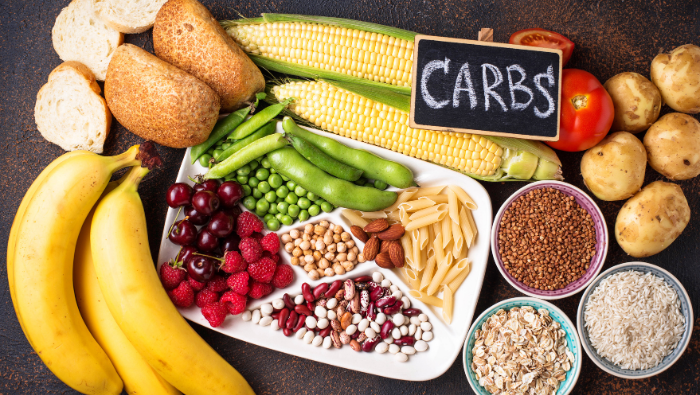
Include carbohydrate-rich foods in your main meals and snacks, such as bread, rice, pasta, noodles, crackers, fruits, milk, and yogurt.
These will help fill up your carbohydrate fuel tank, making sure you have enough energy to push through the race.
However, it’s essential to be mindful of your fiber intake as excessive fiber can lead to gastrointestinal issues on race day.
Scale back on high-fiber items like big salads, fibrous vegetables, and legumes to avoid any potential problems.
The key is to maintain your regular eating habits and avoid experimenting with new foods. Stick to what your body is used to, as this will help you avoid any unwanted surprises on race day.
Also, many athletes swear by carb loading as a way to maximize their energy levels for the big day. However, timing is crucial. Carb loading doesn’t mean overeating a week before the race, as that can leave you feeling sluggish.
Instead, for middle- and long-course triathletes, it’s recommended to start increasing your carb intake two to three days before the race.
You can choose to spread your carb-rich meals throughout the day or have three main meals with high-carb snacks in between.
This approach will ensure your energy levels are at their peak without causing discomfort on race day.
Here are some tips for your pre-triathlon meals:
The importance of carbohydrate loading in race preparation varies depending on the distance and duration of the event. For races with a moderate to high intensity lasting more than 90 minutes, carbohydrate loading can be a game-changer.
To execute this strategy effectively, careful planning is required.
Carbohydrate loading involves tapering down your training leading up to the race while simultaneously increasing your carbohydrate intake. The goal is to “super-compensate” your carbohydrate fuel tank, which primarily consists of your muscle glycogen stores.
By doing so, you ensure that your body has ample energy reserves to sustain you throughout the longer events.
For those taking on challenges like the Olympic Distance, 70.3, Ironman, and beyond, it’s essential to have a tailored plan.
Consulting with an Accredited Sports Dietitian can be immensely beneficial in developing a specific strategy that aligns with your training routine and race goals.
The right carbohydrate loading plan can give you a significant edge in these endurance events. It allows your body to perform at its best, delay the onset of fatigue, and maintain a steady pace throughout the race.
However, it’s essential to implement this strategy correctly, as improper execution can lead to negative outcomes.
With the guidance of a qualified professional, you can optimize your carbohydrate intake and ensure that your muscle glycogen stores are fully stocked for the big day.
Remember, each event and athlete is unique, so a personalized approach is key to unlocking your full potential in longer races.
Here are some examples of meals to eat the night before the Triathlon
The night before a triathlon, it’s essential to focus on consuming a well-balanced meal that provides sustained energy without causing digestive discomfort during the race.
Here are some examples of meals that are suitable for the night before a triathlon:
1. Grilled Chicken with Quinoa and Roasted Vegetables:
- Grilled chicken breast seasoned with herbs and spices.
- Quinoa is cooked with vegetable broth and mixed with sautéed spinach and cherry tomatoes.
- A side of roasted sweet potatoes and broccoli drizzled with olive oil.
2. Pasta Primavera with Shrimp:
- Whole wheat or gluten-free pasta (if preferred) with a light tomato-based sauce.
- Sauteed shrimp with garlic and olive oil.
- A medley of colorful vegetables such as bell peppers, zucchini, carrots, and asparagus.
3. Salmon with Brown Rice and Steamed Greens:
- Baked or grilled salmon seasoned with lemon and dill.
- Brown rice cooked with a splash of vegetable broth.
- Steamed green beans or broccoli seasoned with a touch of sea salt.
4. Vegetable Stir-Fry with Tofu or Chicken:
- Tofu or chicken sautéed with a mix of colorful vegetables like bell peppers, carrots, snap peas, and mushrooms.
- Serve the stir-fry over a bed of brown rice or quinoa for added carbohydrates.
5. Beef or Veggie Tacos:
- Lean ground beef or plant-based meat substitute seasoned with taco spices.
- Soft corn tortillas or whole-grain tortillas.
- Top with chopped tomatoes, lettuce, avocado slices, and a dollop of Greek yogurt (a healthier alternative to sour cream).
6. Grilled Portobello Mushroom Burger:
- Grilled Portobello mushroom caps seasoned with balsamic vinegar and olive oil.
- Place the mushrooms on a whole-grain burger bun.
- Add sliced tomatoes, red onion, and baby spinach as toppings.
Remember these general guidelines for the night before a triathlon meal:
- Remember to have your meal 3 hours before bedtime.
- Focus on complex carbohydrates (whole grains, sweet potatoes) for sustained energy.
- Include a moderate amount of lean protein (chicken, fish, tofu) for muscle repair.
- Add a variety of colorful vegetables to provide essential vitamins and minerals.
- Avoid heavy, greasy, or high-fat foods that might be harder to digest.
- Stay hydrated by drinking plenty of water throughout the day.
What to eat for breakfast before a Triathlon
On race day, the focus is on easily digestible foods that provide quick energy and won’t cause stomach upset. Here are some tips for your race-day nutrition:
Early Breakfast: Have a light breakfast about 2-3 hours before the race start time. Opt for easily digestible foods like bananas, toast with nut butter, oatmeal, or a smoothie with fruits and protein powder.
Stay Hydrated: Continue to drink water leading up to the race. You can also have a sports drink to top up your electrolytes.
Avoid Experimenting: Race day is not the time to try new foods or supplements. Stick to foods you’ve tried and tested during training.
Pre-Race Snack: About 30 minutes before the race, you can have a small snack like an energy bar or half a banana. This will provide a last-minute energy boost.
Stay away from these foods:
- High Fiber Cereals: Steer clear of high-fiber cereals or dense muesli mixes loaded with nuts and seeds. While fiber is essential for a balanced diet, excessive amounts before a race can cause gastrointestinal distress and discomfort during the event.
- Fatty food: Avoid indulging in fatty food with excessive oil and fatty meats. These heavy meals can slow down digestion and leave you feeling lethargic on race day. Instead, focus on balanced meals with a good mix of carbohydrates, proteins, and healthy fats.
- Skipping Pre-Race Breakfast: Skipping breakfast on race day is a common mistake. A well-balanced pre-race breakfast is crucial for topping up your fuel tank and providing the energy you need to perform at your best.
- Practice your pre-race breakfast during training to find what suits you best and ensure smooth digestion on race day.
Here are some examples of easily digestible breakfasts to eat 2 to 3 hours before the Triathlon
Eating an easily digestible breakfast 2 to 3 hours before a triathlon is essential to ensure you have enough energy without feeling weighed down during the race.
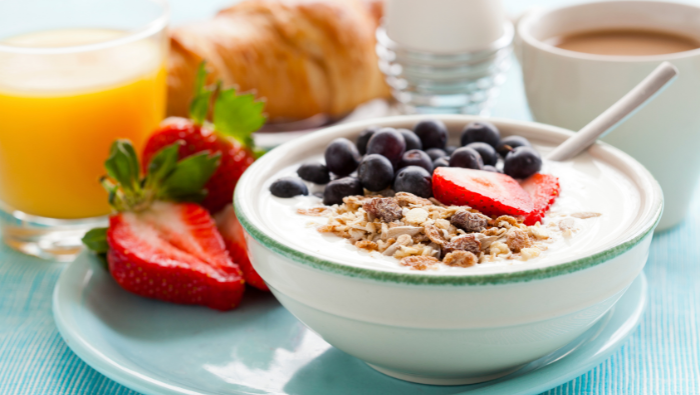
Here are some examples of breakfast options that are light, nutrient-dense, and easy on the stomach:
1. Oatmeal with Banana and Honey:
- A bowl of oatmeal topped with sliced banana and a drizzle of honey provides a good balance of complex carbohydrates, potassium, and natural sugars.
- Oatmeal is gentle on the stomach and provides a steady release of energy.
2. Toast with Nut Butter and Sliced Berries:
- Whole-grain toast with almond or peanut butter and a handful of sliced berries offers a mix of carbohydrates, healthy fats, and antioxidants.
- Nut butter is easily digestible and provides sustained energy.
3. Greek Yogurt with Granola and Fresh Fruit:
- Greek yogurt is rich in protein and probiotics. Pair it with a small amount of granola and your favorite fresh fruits, such as berries or sliced peaches, for a light and satisfying breakfast.
4. Smoothie with Spinach, Banana, and Protein:
- Blend together a handful of spinach, a ripe banana, protein powder (whey, pea, or plant-based), and almond milk for a nutrient-packed, easily digestible smoothie.
- Spinach is a great source of iron, and the banana provides natural sugars and potassium.
5. Rice Cake with Avocado and Sliced Turkey:
- Spread some mashed avocado on a rice cake and top it with a few slices of turkey. This combination offers a balance of carbohydrates, healthy fats, and lean protein.
6. Scrambled Eggs with Spinach and Whole-Grain Toast:
- Scrambled eggs with a handful of cooked spinach and a slice of whole-grain toast provide a balanced breakfast rich in protein and iron.
7. Cottage Cheese with Pineapple and Chia Seeds:
- Cottage cheese is a good source of protein and calcium. Top it with pineapple chunks and a sprinkle of chia seeds for a light and refreshing breakfast.
8. Energy Bar with a Banana:
- Choose an easily digestible energy bar with simple ingredients like oats, nuts, and dried fruits. Pair it with a ripe banana for an extra boost of carbohydrates.
Dealing with stomach issues during a Triathlon
Stomach issues during a triathlon are not uncommon, and many athletes have experienced gastrointestinal discomfort at some point during their races.
However, there are strategies you can employ to minimize the risk of stomach problems and manage them if they occur.
Here are some tips to deal with stomach issues during a triathlon:
Practice Your Nutrition Plan: Test your food and hydration choices during training to find what works for you and avoid surprises on race day.
Avoid New Foods: Stick to familiar options to minimize the risk of digestive issues during the event.
Time Meals Carefully: Finish pre-race meal 2 to 3 hours before the race to allow for proper digestion.
Choose Easily Digestible Foods: Opt for simple carbs like gels and sports drinks during the race to avoid stomach discomfort.
Stay Hydrated: Balance hydration, but avoid excessive fluid intake to prevent discomfort.
Control Your Pace: Start at a comfortable pace to maintain blood flow to the digestive system.
Manage Stress: Use relaxation techniques to reduce pre-race jitters and aid digestion.
Avoid Gas-Producing Foods: Steer clear of high-fiber, gas-producing foods before the race.
Adjust Pace if Needed: Slow down or walk briefly if severe stomach cramps occur.
Seek Medical Help if Necessary: If issues persist, consult medical personnel at the event.
Conclusion
There you have it – the essential guide on what to eat before a triathlon. Proper nutrition is key to powering your body and ensuring peak performance during the event.
Focus on carb-loading with easily digestible foods, while avoiding high-fiber and fatty options. Practice your nutrition plan during training to avoid any surprises on race day.
Remember, each athlete is unique, so find what works best for you. Good luck with your triathlon race! Go for it and give it your all!

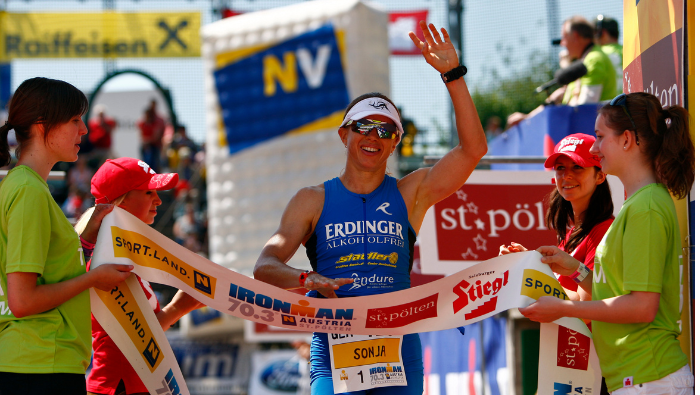
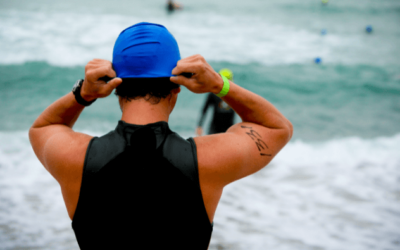
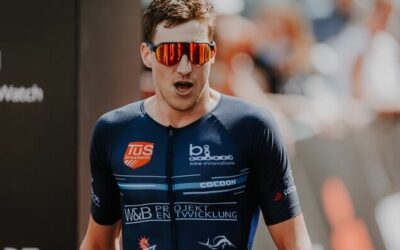
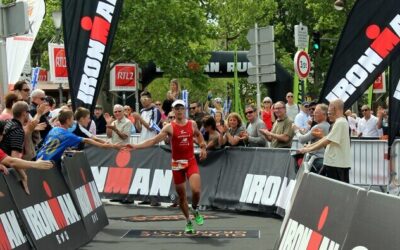
0 Comments